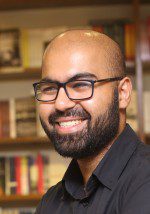Every year, SAI supports Graduate Student Associates from across the different schools at Harvard whose research focuses on South Asia. The goal of the program is to establish a community of peers to support original and independent research in South Asia. Each GSA will give a seminar throughout the academic year – check our website for updates.
 Amiya Bhatia, Doctor of Science student in the Department of Social and Behavioral Sciences at the Harvard T.H. Chan School of Public Health
Amiya Bhatia, Doctor of Science student in the Department of Social and Behavioral Sciences at the Harvard T.H. Chan School of Public Health
Amiya studies the causes, structures and policies that produce health inequalities among children and adolescents in South Asia. Her current work examines how unequal health data are and who is missing in health statistics through an analysis of wealth, gender and urban/rural inequalities in birth registration and access to identification documents in South Asia, and the history of the civil registration and vital statistics systems that count births, marriages, and deaths. At Harvard, Amiya has worked as a research assistant for the FXB Center for Health and Human Rights and as a teaching assistant at FAS and the School of Public Health. She is a member of Harvard Chan Students for Nepal and a resident tutor in Currier house. Before moving to Boston, Amiya evaluated health programs run by local non-profits for children affected by HIV in in India and Ethiopia. She has also worked on health systems strengthening for immunization for the GAVI Alliance and on the polio eradication program for the Gates Foundation. Amiya holds a Masters in Public Health from the Harvard T.H. Chan School of Public Health and a BA in Social Anthropology from the University of Cambridge.
 Gregory Clines, Ph.D. Candidate, Committee on the Study of Religion, Harvard University
Gregory Clines, Ph.D. Candidate, Committee on the Study of Religion, Harvard University
As a historian of religious literature, Greg is interested in questions of newness: how authors mark newness in their texts; how innovation and tradition are weighed against each other; and why both modern scholars and authors themselves value newness in the first place. His dissertation focuses on a fifteenth-century Digambara Jain author named Jinadāsa, who wrote Rāmāyaṇa narratives in both Sanskrit and Middle Gujarati. Greg argues that these works are simultaneously part of a long tradition of Jain Rāmāyaṇa composition and also independent texts with identifiable socio-historical goals. Greg holds a MA from Columbia University and a BA from the University of Virginia. He has taught extensively in both FAS and Harvard Extension School and is currently teaching a Junior Tutorial in Religion that focuses on Indian devotional (bhakti) literature.
 Hardeep Dhillon, PhD Candidate, Dept. of History, Harvard University
Hardeep Dhillon, PhD Candidate, Dept. of History, Harvard University
Hardeep is a third-year doctoral student in the History Department at Harvard University specializing in Modern South Asian History. Hardeep’s research focuses on the anticolonial claims of Indian migrants who were traveling in and through Southeast Asia and North America at the turn of the twentieth century. The project brings forward well-known historical events such as Bhagat Singh Thind v. United States (1924), the 1914 mutiny of the 5th Light Infantry in Singapore, and the Komogata Maru incident. In her approach, Hardeep centers ideas of race and masculinity and brings the histories of Indians in Manila, Hong Kong, Astoria, Singapore, Berkeley, and San Francisco that have been peripheral in our study of India to the fore. More broadly, Hardeep’s research interests include: minority communities, race, migration, rights, citizenship, law, and gender.
 Asad Liaqat, Doctoral candidate, Public Policy PhD program, Harvard Kennedy School
Asad Liaqat, Doctoral candidate, Public Policy PhD program, Harvard Kennedy School
Asad’s field of study is the behavioral political economy of development. The common theme in his research is how underlying societal norms and cues and psychological processes affect interactions among citizens and between citizens and the state. In particular, he is doing research on how citizens’ subjective expectations from the state are formed and what the expectations may mean for government performance. He is also conducting a randomized evaluation of an intervention aimed at fostering empathy and tolerance among school children in Pakistan and India. His ongoing co-authored work is focused on bureaucratic decision making, local government capacity, party responsiveness to voter preferences at a local level and the importance of political connections for local government elections. Asad is a Graduate Student Fellow at the Center for Economic Research in Pakistan, plays for the Harvard Cricket Club and often finds himself reading Urdu poetry during work hours. He holds a BA in Political Economy and Philosophy from Williams College.
 Soledad Prillaman, Ph.D. Candidate in the Department of Government, Harvard University
Soledad Prillaman, Ph.D. Candidate in the Department of Government, Harvard University
Solé’s research focuses on comparative political economy, economic development, gender, and the politics of the welfare state, with a regional focus in India. Her dissertation seeks to better understand why women in India, and developing countries more broadly, are particularly disengaged from politics and to identify the mechanisms through which the prevailing political gender gap is reduced. In doing so, Solé evaluates the mechanisms by which the state is strengthened through increased political integration of women in India by detailing the oft-unconsidered consequences of development interventions for political behavior and local politics. Additionally, her dissertation evaluates how women who have become active political agents organize politically and are received and resisted by traditional political networks. Prior to entering Harvard, she received a B.A. in Political Science and Economics from Texas A&M University in 2011.
